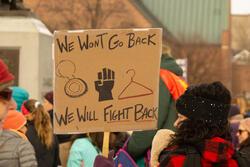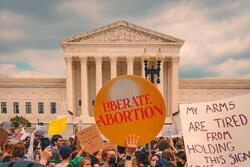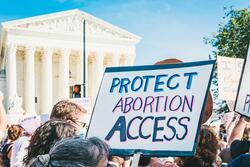The Last Legal Abortion in Missouri
The last legal abortion in Missouri was performed the morning of Friday, June 24, less than one hour before the Supreme Court overturned Roe v. Wade and Planned Parenthood v. Casey, and before—mere moments later—Missouri became the first state in the country to enact its trigger ban, which immediately made it a felony to provide an abortion in Missouri.
The patient who had this abortion was born with a medical condition that made pregnancy a risk to her health, and her pregnancy likely would have killed her if she wasn’t able to receive this life-saving care. Her abortion was originally scheduled for that Friday afternoon, but given the great concern that the Supreme Court decision overturning Roe would come down that day, medical providers scrambled to rearrange her travel from rural Missouri to get her to St. Louis earlier. Thanks to their dedication, this young woman, who had all the odds stacked against her, received the care she needed.
Later that same morning, I sat with my colleagues at the offices of Pro-Choice Missouri, listening as our Executive Director recounted this story to us. As she talked, we cried. We cried and we held each other, and we took a moment to simply sit in the horror of this historic moment. And then, we got to work.
Before I continue, there are a few points about the fall of Roe that are worth emphasizing. First, the effort to overturn the 1973 decision was never about banning abortion—it was always about controlling who could get an abortion. We know that restrictions and bans on abortion fall hardest on those already facing the most barriers to accessing care, including those living paycheck to paycheck, people in rural areas, Black people, indigenous people and other people of color, members of the LGBTQ+ community, immigrants, young people, and people with disabilities. This decision has nothing to do with saving lives and everything to do with propping up interrelated systems of white supremacy, capitalism, and patriarchy.
Second, while the fall of Roe was a gut-punch, none of us should have been surprised by it. Organizers who have been fighting abortion restrictions for decades—historically under the leadership of Black women—have been warning of this moment for a long time. And guess what? We didn’t listen to them. For many straight, cisgender, economically secure white women (of which I am one), this is the first time our access to abortion has been threatened in a real way. The outpouring of shocked outrage from some in this group is rooted in the long-time privilege of not having to worry about being able to get an abortion.
And third, the fall of Roe is absolutely an example of the stranglehold that Christian extremism has on our society. As a Jew, I’m simultaneously infuriated by the fact that a small subset of one religious group feels it has the right to impose its beliefs on everyone else, and relieved that I was not raised in a religion that demonizes abortion. That being said, I’m not terribly interested in what any religion, including my own, has to say about abortion, because abortion is a healthcare procedure, not a topic for theological debate. Full stop.
Many people are wondering what the post-Roe landscape will look like. As a professional working in the reproductive freedom space in Missouri, I can tell you that, while the fall of Roe is as devastating here as anywhere else, Roe was never enough—our state has been living in a post-Roe reality for years. Even before the decision, Missouri was down to its last abortion clinic. What’s more, our state had a 72-hour waiting period to receive an abortion, a requirement that providers give patients medically inaccurate and religiously-driven “informational materials,” and myriad other restrictions all designed to delay the process, make accessing an abortion as difficult as possible, and deter individuals from getting abortions. Because of all these barriers, the vast majority of Missourians were already leaving the state to access abortion.
Since so many other states in our region have now banned (or will soon ban) abortion, more and more patients have to travel further and further to seek care at clinics in states where abortion is still legal. The strain on existing clinics, such as two located in southern Illinois, not far from St. Louis, is very real, with waiting periods getting longer and patients traveling from all over the country.
I’m a Pro-Choice Missouri Clinic Escort at Planned Parenthood in Fairview Heights, Illinois. Escorts are volunteers who help patients get to their appointments in a safe and timely manner. They play a critical role in providing both a physical sense of security and a calming presence for patients who must face a line of hostile anti-abortion protesters. During my last shift alone, I saw license plates from Missouri, Illinois, Arkansas, Tennessee, and Florida. While I’m grateful that at least some people have the ability to make these journeys, many more cannot, and the distance alone—before adding in any other barriers—will be enough to prevent a lot of people from getting abortion care.
While the landscape here is pretty bleak, pro-abortion organizations in Missouri are meeting the moment. Missouri Abortion Fund continues to raise critical dollars to help patients pay for their procedures in other states. Planned Parenthood of the St. Louis Region and Southwest Missouri has set up a Regional Logistics Center which helps arrange and pay for transportation, lodging, and other logistics related to accessing abortion. St. Louis mayor Tishaura Jones just signed into law Pro-Choice Missouri’s bill establishing a Reproductive Equity Fund in St. Louis City. The bill directs $1.5 million in American Rescue Plan Act funds to support logistical access to abortions, access to doulas, lactation support, and access to mental healthcare throughout pregnancy and postpartum.
Since decision day, my colleagues and I have received countless messages from people all over the country asking us what they can do to help. Here are just a few suggestions:
- Say the word, “abortion” and speak about abortion in gender-inclusive ways. How we talk about abortion is important, and part of that is simply saying the word. Saying “abortion” normalizes it, detracts from stigma surrounding it, and models for others that no Supreme Court decision or law will make us afraid to talk about this completely routine and normal healthcare procedure. Also, keep in mind that people of all gender identities and expressions need abortions, and those who are transgender and gender non-conforming are among those who experience some of the worst barriers to accessing this care. When talking about abortion, instead of saying “women,” try “birthing people” “people with uteruses,” “people who can give birth,” or “people who need abortions.”
- If you want to get involved in the fight for abortion, join the organizations that are already doing this work. In the wake of the decision, we’ve seen many people—mostly white women—creating their own responses. People are doing things like stockpiling Plan B, offering to take people on “camping” trips, and talking about creating abortion “undergrounds.” None of this is helpful, much of it is outright harmful, and these actions only serve to center the experiences of white people and erase the Black people and organizations that have long been leading the pro-abortion movement. If you want to get involved, do some research to locate the organizations in your community doing this work. Your local abortion funds, abortion clinics, and pro-choice advocacy organizations can all be great places to start.
- Donate to organizations that are doing this work on the ground. Local organizations, especially those in states with the most severe restrictions on abortion, are on the front lines of this crisis and are often small nonprofits with tiny operating budgets. The local abortion fund or pro-choice advocacy organization isn’t going to get $275 million dollars from MacKenzie Scott due to a lack of widespread name recognition and general clout. But these are the organizations doing the absolute most to help people access reproductive healthcare. It is critical that their work is funded.
As I said earlier, I’m not all that interested in what Judaism has to say about abortion. I’m much more interested in what it has to say about our responsibility to fight for justice. Jews are called to tikkun olam (repairing the world), and the state of abortion access in this country is in desperate need of repair.
I envision a world in which anyone can easily access an abortion in their own community and in which the experience is free from any shame or stigma. As I sit here in Missouri, a red state with an abortion ban in place, I truly believe that if we all work productively together, that world is within our reach.
And someday, hopefully not long from now, we will share stories of the first legal abortions performed after we win back our rights.








This is very useful and important topic for women health. Thank you for sharing this information. Medical Abortion is one of the safest method. I can suggest online pharmacy where you can purchase Abortion Pill online, that is OnlineGenericPillrx shop.